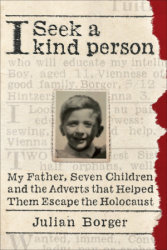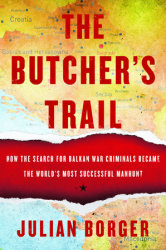
Books by Julian Borger published by Other Press
Author Q&A
The Butcher’s Trail, the new book from Julian Borger, is a simultaneously thrilling and horrifying read. Its subtitle, “How the Search for Balkan War Criminals Became the World’s Most Successful Manhunt,” gives a sense of its scope.
Borger covered the wars in the former Yugoslavia in the 1990s, and is presently the diplomatic editor for The Guardian. The Butcher’s Trail focuses on the efforts of an international coalition to seek out and capture dozens of war criminals whose atrocities horrified the world. It’s a gripping picture of a particular historical moment in which international concerns over human rights achieved a significant goal. But Borger also looks at the wider legacy of the manhunt in question: how some of the techniques were utilized by the United States for good and for ill; the current status of the International Criminal Court; and a renewed nationalism that ignores the atrocities carried out by many in the Balkans.
We spoke with Borger about the origins of his book, as well as what can be learned from the history that he describes.
PENGUIN RANDOM HOUSE:At various points in The Butcher’s Trail, you reference your own interactions with some of the participants over the years. When did your work on this book begin? Did it start with your work as a reporter, or did the idea to write come later?
JULIAN BORGER: I covered the Bosnian and Kosovo wars and their aftermath, so some of my encounters with the war crimes fugitives back then were as a reporter – my conversations with Dragan Gagovic for example. It was only when the last fugitive was caught, Goran Hadzic in the summer of 2011, and I wrote a feature article about this extraordinary fact, that a UN-mandated court had rounded up all the suspects on its list. In doing it, I realized that I was only scratching the surface, and that there was this thick seam of buried history of a protracted, fascinating manhunt down there that had never been properly investigated.
PRH:What was your process like as far as researching the book? Were there any aspects of the search for war criminals that were more difficult to find information about than others?
JB: It was a very complex story involving many countries and many institutions, military and intelligence agencies. I started with the people I knew had been involved even tangentially, and most of them gave me a list of a dozen or so other people, and it went on from there. I had this constantly expanding list of hundreds of names and I set about trying to find them. Many of them told me to get lost. Special operations soldiers and of course intelligence agents are not supposed to talk about what they do, even after they retire.
That was the toughest part, getting people to open up about something they weren’t really supposed to talk about. But some did. Some were bursting to talk about it, either because they were proud of what they did, or because the stories they had to tell were too good, or weird, or funny. If I were to estimate, I would say between a third and half the people I approached agreed to talk to me. It used to trouble me to think of all the accounts still out there, which I hadn’t heard. But at some point you have to draw a line, and write what you have, or it never gets written.
PRH:One of the most memorable scenes in the book involves an elaborate Delta Force plan to capture a war criminal using, among other things, a gorilla costume. Were there any other moments that equaled this for a blend of espionage and surrealism?
JB: It is hard to rival the gorilla suit for surrealism. But the story is full of bizarre scenes. The last drunken hours of Slobodan Milosevic’s life as a free man, surrounded by drunken and armed family members, for example.
The whole story of Radovan Karadzic’s life as a fugitive in Belgrade, hiding in plain sight as a spiritual healer, whose services including sex therapy. He claimed to be able to energize a man’s sperm simply by putting his hands in the general vicinity of his reproductive organs. In his bearded and top-knotted disguise, he hung out and even played a folk instrument at his local Belgrade bar full of Serb nationalists who idolized Karadzic. His picture was on the wall, but none of his fellow drinkers recognized him. And then there is the final scene with all the war crimes defendants of all ethnicities in prison together in The Hague. They had carried out atrocities in the name of ethnic purity. Inside, they got on wonderfully, playing football together and cooking each other meals. If our children went looking for a retirement home for us, one of them said, they couldn’t have done better than this place.
PRH:Late in the book, you describe a meeting between Radovan Karadžić and the Russian writer Eduard Limonov. Karadžić was himself a writer; did you find any other occurrences of war criminals also having a foot in the artistic world? Do you see a conflict there?
JB: Modern European nationalism grew out of the Romantic movement, so its history is full of people who saw themselves as warrior-poets. Karadžić was simply the latest and one of the more extreme in that lineage. His deputy, Nikola Koljevic, was one of the region’s foremost experts on Shakespeare. They saw themselves on a noble, heroic quest. Belgrade and Zagreb were full of self-styled intellectuals churning out screeds that mixed national self-pity with a lust for blood and territory. Much of the actual killing, however, was done by people who had been on the criminal fringes of pre-war society. They suddenly found themselves empowered. The romanticism and poetry just helped to rationalize the atrocities and paper over the moral vacuum.
PRH:At one point in The Butcher’s Trail, you note that the search for war criminals in the late 1990s effectively led to the rendition program that’s been used to much more problematic ends. Do you see other direct connections between policies and procedures developed during this search and more recent ethically dubious actions taken by the United States government?
JB: They took the techniques learned in the Balkan manhunt, but not its legal underpinning. That manhunt was a high point in collective enforcement of international humanitarian law. The war on terror saw that achievement unravel. Even before 9/11, the Bush administration went as far as to “unsign” the Rome statute establishing the International Criminal Court. The lesson, learned at great cost in the Balkans, is that there is no enduring peace without justice. That lesson has since been unlearned. The short-lived idea of the international community’s ‘responsible to protect’ civilian populations has all but died off. Impunity is back. Assad was confident he could act with impunity in Syria, for example.
PRH:You quote one Delta Force leader as saying that the techniques used to seek out war criminals in Europe were subsequently used in Iraq and Afghanistan. Would you say that this is also applicable to conflicts in Syria and with ISIS?
JB: Yes. Since the Balkans, manhunting has become a core function for intelligence agencies and special operations units. They learned to cooperate, to integrate, to use drones and trace SIM cards in the former Yugoslavia. But the level of technical sophistication of the tools available has increased many times over.
PRH:Near the end of the book, you discuss how the legacy of war crimes in the Balkans is still a troubling aspect for many in the former Yugoslavia. Do you expect that this will eventually improve, or is it possible that we’ll see a doubling down on the kind of nationalism that can lead to wars and atrocities again?
JB: What I find most troubling about the region now is the extent and depth of denial in nationalist circles. I went to Srebrenica where Muslims can live among the Serbs on condition they don’t try to talk about what happened there twenty years ago. Serb children are not taught about the mass killings. Muslim, Croat, and Serb children mix less than they did ten or fifteen years ago, and they have different ideas of history. That seems to me very troubling for the long-term cohesion of the country and the region. I don’t think that will lead to wars and atrocities in the foreseeable future, but it will lead to continuing political paralysis, unemployment, and alienation.
PRH:At the end of The Butcher’s Trail, you mention the questions and controversies surrounding the International Criminal Court. Can you foresee a time when the ICC has a more universal jurisdiction?
JB: Not really I’m afraid. Neither the US nor Russia nor China has any interest in a court with universal jurisdiction. The best hope in the near term for confronting impunity for crimes against humanity are regional and hybrid courts. Maybe the best hope for a court for Syrian war crimes would be in the Arab world with UN support perhaps.
Visit other sites in the Penguin Random House Network










